🇫🇷 Cliquer ici pour lire cet article en français
Introduction
Ukraine news is sparking a lot of debates. I think it is very characteristic of today’s world: it opposes people very strongly. One side says that Putin is the new Stalin oppressing the Ukrainians. The other side claims that Putin saves us from the New Nazis: the Ukrainians.
In fact, this is nothing else than a proxy war between Russia and the US.
Russia? Okay, Ukraine is on their border. The US? Really? What would they be doing so far from their homeland?
Geopolitics, war and manipulation
Geopolitics is a complex matter. War, in contrast, makes it always all black and white. Media outlets immediately transform into propaganda tools. They “inform” the public about who is good (us) and who the bad guys are (them).
Of course, there are always two sides of the coin, so the “bad guys” on one side are the “good guys” on the other one.
However, it is never black and white.
World War I was allegedly sparkled by the assassination of the Archduke Franz Ferdinand of Austria. However, as soon as you read about how the war started in more detail, it becomes obvious that this event was only a sparkle in an already complex and tense situation.
The same goes for WWII. To understand how the escalation was possible, one needs to learn about the context. This includes the consequences of the Peace Treaties signed at the end of WWI, the world economic crisis in the 1930s, and many other factors. Existing tensions between different people and nations within Europe also played a great role. The inaction of France and Great Britain before it was too late was also a key factor.
The Syrian war is another example of extremely complex events and relations: petroleum and economic interests, religious differences, interactions between different people and cultures, previous ties with Russia, and the geographical situation on the Mediterranean Sea.
It is no different with the Ukrainian crisis.
Resources in Ukraine
Ukraine is a big country. It is also a very important economic partner for whoever has their favor. It produces tons of wheat and other agricultural products. Additionally, it has huge mineral resources as well as an industry to manufacture things from those mineral resources. Last but not least, it benefits from a very nice climate and a lot of water, which becomes a more and more valuable resource.
Besides, its geographical situation put it at the crossroads in many ways.
It is a buffer between Europe and Russia. As such, several gas pipelines run through it, bringing the much-needed Russian gas to Europe. This is even more and more critical with the energy crisis that has started a year ago.
Ukraine also has a lot of water. Did you know that Ukraine closed the main water source to the Crimean Peninsula? The blockage was removed in the very first hours of the Russian intervention in Ukraine.
Because of all these elements, Ukraine is a strategical country, and whoever controls it gains a lot of power. But to understand what is unfolding today, it is necessary to know its history.
USSR, Russia and NATO
NATO (North-Atlantic Treaty Organization) was created in several steps. Originally, it was a purely European initiative. At the time, France, the UK and other European countries feared a revival of Germany as well as aggression from the Soviet Union. Several treaties to vow mutual help were signed. the US joined in and set the main direction that NATO would finally take. It became a union against the USSR and its NATO equivalent: the Warsaw Pact.
The fall of the USSR
With the fall of the USSR in 1991, the Warsaw Pact naturally collapsed as well. However, it wasn’t given up without getting any assurances and promises that NATO would not try to grow toward Russia. However, those promises by the US to Russia did not lead to a Treaty that would have sealed them.
Here is the state of NATO vs Warsaw pact borders in 1990, just before the collapse of the USSR.
After the collapse of the Soviet Union, all countries of the Eastern block became independent. Historical countries which existed before the Soviet Union gained their independence back on the Western part of what became Russia: the 3 Baltic states, Belarus and Ukraine. To acknowledge the failure of the Communists, the Russian block lost significant territories and countries on the South and South East as well.

The way this was split is, I believe, the original cause of the current problem. We will come back to this later.
The Dark 90s
The 90s were a very dark period for Russia, with rampant corruption eating up the country. To give you an idea, the privatization of the whole country became a playground for oligarchs. They were buying entire cities and in some areas, they ended up fighting with tanks in the streets for power.
Besides, the situation of the people became extremely dire. The ruble was falling like never before, corruption was eating up the country, and overall, the drunken Yeltsin openly mocked by everyone was adding to the humiliation.

It was also a difficult time for the republics that suddenly became independent. While on the long run it has proven beneficial for most of them, some are still plagued with corruption to this day. This includes Bulgaria and Romania even though they have joined the European Union. And it also includes Ukraine.
The dark 1990s culminated with the Chechen terrorism and the Moscow hostage crisis in 2002. The first Chechnya war in 1994-96 was another failure.
Revival in 2000s
Putin put an end to the Chechen situation, which was secretly supported by the West, with a very bloody war. This was a strong message to his Western “partners”, as he likes to call them: “don’t mess with me”. In the meantime, it was also a message to Russians: “I’m not Yeltsin and I will protect you and our honor”.
However, in the meantime, NATO expanded to the east, by including Poland, Hungary and the Czech Republic. One can wonder, as the Russian Bear was crumbling and no longer an existential threat, why would NATO even still exist in the first place.
Putin started restoring order in Russia by arresting oligarchs, as well as trying to get the economics under control. Effectively, the ruble began to be more stable. Starving people could eat again. Not that everything was perfect, very far from it. But there was a clear improvement. One can say that he somehow revived the bear from its ashes.
However, internationally, he was always dismissed and ridiculed, as if Russia had become an insignificant 3rd world country. He did try to negotiate with the West, to no avail. Many analysts agree on this: the constant humiliation shaped today’s Putin.
In 2007, he delivered a now very famous speech in Munich, in which he warned Westerners of the dangers of a unipolar world.
NATO expansion
In the meantime, and totally against the promises made in 1991, NATO continued its expansion toward Russia. This time, it grew directly on the very border of Russia by including the 3 Baltic states in 2004. This sparked the anger of Russians. Bulgaria, Romania, Slovakia and Slovenia also joined NATO the same year. Romania even agreed to host US missiles with nuclear capabilities.
In 2008, NATO invited Moldavia and Ukraine to join, but these were only negotiations. However, Putin already started strongly voicing his concerns that Ukraine joining NATO would be a red line not to cross.
Well, Ukraine is a sovereign country after all. It should be free to do whatever it desires. Right? However, we have to look at the reality rather than the theory.
Remember what happened when Cuba invited the Soviets to put nuclear missiles on their soil? The world was on the verge of World War 3. If the Soviets hadn’t backed away, the first step would have been the destruction of Cuba, paving the way for a potential full-scale world war. It is no different today, geopolitically, with Ukraine and NATO. It is only the mirror situation of the Cuban missile crisis.
Still, NATO continued to grow in Europe, ignoring the growling bear. Albania and Croatia joined in 2009, Montenegro in 2017 and North Macedonia in 2020.
Georgia – 2008
Westerners continued to try and break any form of cooperation between Russia and former Soviet states. This is an obvious attempt at “total control” by the US and the West, to weaken the former Soviet block. Geopolitics is about influence. The more nations the US have under their control, the more we advance toward a unipolar world. And the more NATO puts missiles on Russian borders, which is a direct sign of aggression, the less safe the world is. Does Russia station nuclear warheads on the borders of the US?
Anyway, back to Georgia. Things didn’t really go as planned. Russia helped rebels right along its border in the north of Georgia. In August 2008, the Georgian army attacked a Russian battalion which was helping rebels. The reaction was immediate with the sudden and unstoppable invasion of the north of Georgia. The Georgian army retreated and signed a peace agreement with Russia. Georgia lost significant territories in the north. Since then, Georgia has been “very nice” to Russia, while still reinforcing slowly its ties with the West.
Conclusion on NATO
NATO is a threat to Russia, just like the USSR missiles were a threat to the US. No politician in his right mind can deny that. Besides, NATO has grown so boldly that it shares now borders with Russia in 2 of the Baltic States. A map is worth a thousand words, just admire the work.
To conclude, the American diplomat Zbigniew Brzeziński wrote that if the US could get a grip on Ukraine, it would be the end of any kind of Russian influence in the world. Make no mistake, this is what is at stake here.
Popular Revolutions
To understand how the US is actually a strong actor in the Ukrainian crisis, we have to look at how it acts in other places of the world.
Arab Springs
The Arab Springs have shaken the Arab world since 2010. In Tunisia, Egypt, Bahrain, Libya, the UAE, Yemen, Saudi Arabia, the process is always the same.
You start with a sparkle that generates popular unrest. People start protesting, peacefully, in the streets. You then fund militias that escalate things quickly. Those militias specifically target the Government, and create the right environment to make a coup. Of course, this works only within countries that already have many problems and where resistance toward the government is boiling. Authoritarian regimes are the perfect targets for this kind of manipulation.
The huge advantage is that you can completely change a country with very little effort. Besides, as you are working under cover, nobody is going to point fingers at you.
Unfortunately, the result might not really be in the favor of the people there. In fact, it is quite the opposite. Yes, dictators are not cool, it is totally obvious. There is no arguing with that. However, chaos, instability, war, lead to far worse situations for the people who live there.
An extra note: no country in this world is going to pour millions of dollars, put its own citizens at risk, to “liberate” foreign populations from the grip of an authoritarian leader. You would be very naive to believe such a fairy tale. You don’t bring “democracy” with bombs or even “coups”, but with education.
Libya
Libya is one of the most blatant example. There is no doubt Gaddafi was a dictator. He was brutal with any opposition to his rule. I will certainly not deny that.
However, his country was at peace, had a prosperous economy with free education and medical care, and a modern infrastructure. Today, 10 years after the “liberation from the tyrant”, Libya is all ruins, desolation and war. It is also a corrupt gate for African migrants rushing toward Europe.
Besides, the war included totally illegal military interventions, mostly by France, in a country’s sovereign territory. It seems that the motivations for the French attacks were all but for “democracy”. In short: Gaddafi was challenging the petrodollar, he was also undermining the French dominance in Africa with his Gold Dinar. And the French president at the time, Nicolas Sarkozy, also had a personal interest in the matter.
As far as international laws are concerned, it was as illegal as what Putin is doing today in Ukraine. But it was France. Not a “dictator”. But “peacekeepers”. Right. Remember the black and white propaganda I was talking about at the beginning of this article?
Syria
There would be a lot to say about Syria as well. I’m going to keep it short. Military interventions by Western countries (the US, France, Britain, Turkey, Israel and others) is also totally off the charts when it comes to International Law. To say the least, we just don’t give a damn. But we’re the “good ones”, remember?
On the other hand, the Russians were clearly “invited” by the Syrian government for help. Whatever you think about Putin’s “sympathy” to the Syrian leader, Bachar El Assad, let me deliver my thoughts on why Russia actually intervened.
Interestingly, Russia has only one military facility in the Mediterranean Sea, which is located in Tartus, Syria. It is noteworthy that Russia decided to send troops to Syria when the rebels came close to that military base. Is it really a coincidence? I’m not sure what would have happened if that base did not exist.
Syria has been a very important event in my opinion in the psychology of Putin. He has realized that his military power is greater than he thought. Moreover, it sends a strong message to the international community: the West meddling into the affairs of a sovereign country failed miserably.
It is a humiliation for the US, who obviously seek revenge.
Belarus and Kazakhstan
I personally know some Belarusians, and I’m no fan of the current government. As I’m not a fan of all those dictators all over the world. For the last decade, there have been many protests in Belarus. More recently, we’ve seen the same tactics that have been used in the Arab Springs in Belarus. Sparkle unrest. Fund armed militias to escalate chaos. Try to destabilize the regime.
But this time, it didn’t work. Russia is backing Belarus and those tactics become a little bit too obvious.
The same happened even more recently in Kazakhstan, this time with radical Muslims. With a swift action of Russia, the tactic has failed, just like in Belarus. Russia cannot afford to lose Kazakhstan, since it is home to one of its main cosmodromes, Baikonur.
It seems the US will have to change their modus operandi, it is getting old.
Russophobia
Phobia of oppressors
Abuse tends to generate a long-lasting hatred by the oppressed that most of the time crosses generations and is still there decades or centuries later. In the meantime, the persecutors also tend to feel a long-lasting feeling of superiority and disdain over the oppressed, long after the actual domination itself stopped.
All over the world, hatred can be seen toward oppressors:
- America all over the world, as a country that is perceived more and more as “imperialist”,
- France in its ex colonies,
- whites by blacks in America, South Africa and many other configurations, whites being perceived as “colonialists”,
- the West in general in China due to the abuses in the 19th century,
- etc.
Soviet Imperialism
Of course, Soviet Russia, as an authoritarian and oppressive regime over many of the “Republics” it had under its control, is the subject of a deep hatred. Although most older adults in those Republics speak Russian since they were forced to learn it in school, they also hate the Russian occupants. It is especially true in Poland, the Czech Republic, and the Baltic states. The sounds of Russian military troops and tanks in the streets of their cities is still a very vivid nightmare.
Who can blame them? Certainly not me.
In the Baltic States, it even goes to another level. During Soviet rule, they have endured ethnic cleansing. Population replacements. Nasty stuff. And they have very distinct cultures, languages, from the Russians. Hence, the nationalist sentiment today is strong. It goes to the point that some people of Russian origins do not have access to citizenship and are citizen-less, with a “gray passport”, not Russian, nor Estonian, for instance. Of course, it doesn’t prevent them to live there, and they generally cope fine, but it is an interesting fact, nonetheless. It reflects a general mindset, the deep-rooted animosity against Russians.
There is hope
However, despite all these difficulties, there is hope. I’m referring here to Germany and the Nazis.
While the Nazis occupied many countries very brutally during WWII, the relentless efforts by the Germans to make amends has paid off. People who were oppressed by the Nazis during WWII generally do not show such anti-German hatred. It is well established that today’s Germans are not the same as the Nazis.
Granted, in the last 2 decades, the anti-German sentiment is fueled again by “oppression”, this time an economic one. Indeed, it is more and more obvious that the euro is serving German interests at the expense of other countries. But that is a different matter.
Interestingly, we simply need to distinguish regular people from the oppressor. When you name the Nazi party on one side, and the Germans on the other, things become clearer. Hatred dissolves easier.
Maybe it is time we called things by their real names. Soviet Politburo occupation vs Russian citizens. Slavers vs regular citizens of the US, France, and other countries. Incidentally, the Slaves actually gave their name to “slavery”, since they were heavily traded as slaves during the Middle Ages.
Besides, maybe the Poles could remember that without the Soviets, we might actually all still be under Nazi rule…
Overview of the Ukrainian crisis
Ukraine is the birthplace of all Slavs. The Kiev Rus are at the origin of all Russian culture. As such, it is always regarded by Russians as a “sister country”. Many Ukrainians also have a positive view on Russia. As such, a war between those two countries is a fratricidal war. And it will certainly grow the anti-Russian hatred further.
Ukraine’s borders have changed a lot in history. However, its central territory has been part of the “Greater Russia” for centuries, and most of its history. The problem is that there have been very different influences in different parts of Ukraine.
A non-uniform population
In the west of the country, most people speak Ukrainian, a language which has a lot in common with Russian but that has been influenced heavily by Western languages, Polish, Belarusian and Baltic languages. Those western parts also have been sometimes independent, sometimes under Polish or Austro-Hungrian rules. They are definitely turned towards Europe in general.
By contrast, the more you go east, the more you meet with Russian-speaking populations. Unsurprisingly, you also find more people who are sympathetic to Russians in general.
On both sides, the more you go away from the center of Ukraine, the more people will have cultural and economic ties with their neighboring countries on one side or the other. With ultra nationalists in the west, and ultra Russians in the east.
For people who are skeptical, an image is worth a thousand words. Here are the results of the 2004 election.
Ultra-nationalism
Besides, ultra-nationalist sentiment, associated with Russophobia, is only strongly present in Western Ukraine. The Nazi party Svoboda, the Social-National Party of Ukraine is typical of that. It takes its very emblem from the historical Nazis.

Yes, people will tell that ultra-nationalist parties exist almost everywhere. Indeed, there are crazy people in all countries. Agreed, Svoboda has only one chair in parliament at the time of the writing of this article. That is true, it is a tiny minority when considering Ukraine as a whole. However, it can grow to almost a majority in some regions and under certain circumstances.
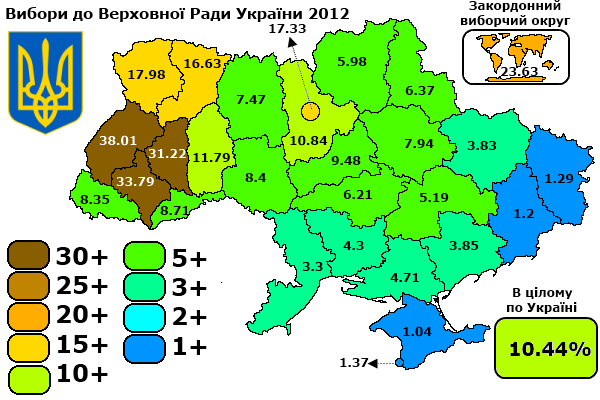
Multiculturalism happens elsewhere
Don’t get me wrong. There are many countries, especially large ones, that have quite different cultures internally and that do just fine. At least they are ok and not at war. But for it to work, you have to enjoy some kind of stability within the country. One way is having a tyrant that holds the whole thing together. Another way is simply to have vowed peace and mutual understanding.
Switzerland shows the way. It is comprised of four totally different types of cultures and languages, yet has been conflict free for two whole centuries.
One could argue that the Ukrainian situation today is not so different from the US partition between Republicans and Democrats, Union vs Confederates. The main trouble in Ukraine is that those differences are used by foreign powers to divide people within the country.
In the 20th century
Ukraine made a first attempt at independence in 1917, trying to benefit from the chaos in Russia during the Russian Revolution. However, it was short lived as the USSR occupied Ukraine in 1922.
When WWII started, Western Ukrainians generally saw this as a tremendous opportunity to break free from the USSR. Remember, they are the most “nationalist”, to the point where a portion of them actually joined the Nazi ideology. This is where current Nazi groups, parties and organizations come from in Ukraine.
After the war, however, as Ukraine was again under Soviet rule, it suffered a terrible repression from the Stalin regime, with orchestrated famines and cleansing. By 1954, Ukraine was an economic powerhouse for the USSR, and Khrushchev decided to gift Crimea to Ukraine. A move that would have nasty repercussions later.
In any case, the anti-Russian sentiment, especially in the west of the country, has been sparkled by those decades of abuse. The first thing an authoritarian regime does is try to destroy the local culture and language. However, people tend to forget that the average Russian today has nothing much in common with Stalin.
1991-2004
With the collapse of the USSR, Ukraine finally gained independence for good. Agreements with the US, Britain, and Russia ensured that Ukraine would remain a sovereign state, on the condition that they gave up all nuclear weapons from the USSR.
From my point of view, this is the agreement that created the mess we are witnessing today. Grouping two different people with different ambitions was clearly not a great idea. However, not many people realize this simple yet terrible fact. Yugoslavia showed us in the 1990s the same kind of tragic geopolitical mistake. There is probably a lesson to be learned here.
Corruption
At this point, I want to pause a little and put some focus on one other problem that is also responsible for today’s situation.
Corruption is deep-rooted in Ukraine, similar to the one Russia experienced during the 1990s.
Since then, Russia has done some cleanup. It has arrested oligarchs, raised its economy in general, and is one of the countries with the smallest public debt in the world. All this despite heavy and continuous economic sanctions from Western countries since 2014. There are still a lot of challenges in Russia and definitely strong corruption problems, but the conditions have improved dramatically since the 1990s. For the record, Western countries are far from being corruption free!
In Ukraine, however, all of this didn’t happen. The result is that, despite having a very large industry, lots of natural resources and a thriving agricultural sector, poverty is still a very worrisome situation. I recommend one documentary called “Teenagers who live Underground” to get a grip of the problem. In 2012, Ernst and Young put Ukraine among the three most-corrupt nations of the world, and 9th nation in 2017. So it is getting better but Ukraine still has a long way to go.
The latest leak “Swiss Secrets” cites Ukraine most along with Venezuela, Egypt and Thailand:
Besides, the President is also deeply involved in corruption despite claiming he’s fighting it, as we’ll see later.
2004 Orange Revolution
Let’s continue our trip through time. In 2004, two candidates fight for the presidency:
- Yushchenko and his support Yulia Tymoshenko => US and EU support
- Yanukovych => pro-Russian
Both sides get funding from their respective supports. For instance, international foundations such as The Soros Foundation, Freedom House, etc. on the Western side.
Yanukovych is elected, which sparks protests. Those protests are of course funded and fueled by its Western enemies. The elections are canceled and the pro-West Yushchenko, who has been poisoned in the process – guess by whom -, is finally elected, by a very narrow margin.
One important factor here is that Kiev, the capital city of Ukraine, is located on the mostly “pro-Western Ukrainian” side of the country, which makes it easier to overthrow any pro-Russian government.
2010 setback
However, Yushchenko’s mandate doesn’t go very well. The 2008 economic crisis certainly doesn’t help, and the Ukrainian economy is not getting better, on the contrary.
The next elections are held in 2010, and the pro-Russian Yanukovych wins. However, he does try to negotiate an economic partnership with the EU. This sparks big protests from his party. Indeed, making free-trade agreements with the EU would endanger the whole eastern side of Ukraine, which has strong economic ties with Russia. After a few months, later, he finally gives up and turns to Moscow. to make a deal.
2013 Maidan
The change in tone sparks protests in Kiev, on Maidan Square. The interesting part here is that you can see European and US diplomats coming in person to support the protesters. This is a total violation that can be called “meddling in the internal affairs of a foreign country”. But remember, we’re ”the good ones”.
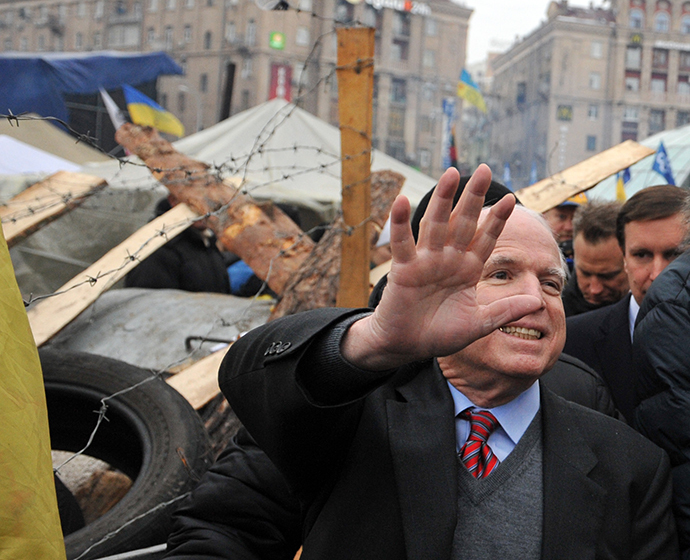
In the meantime, the US uses the exact same tactics they have been using successfully in the Arab Springs. They turn to the Nazi extremists who are pro-West to do the dirty job. Those radical organizations play a decisive role in what will unfold. Stopping at nothing to spark unrest, snipers shoot both the protesters and the police.
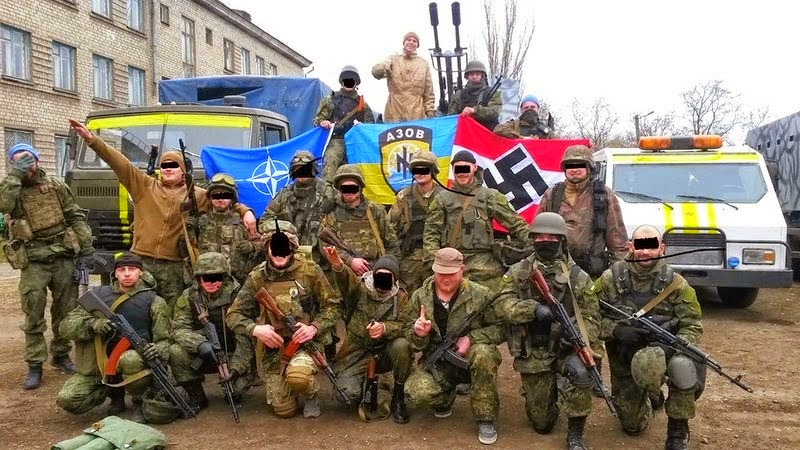
They escalate violence until the government is overthrown.
US and Western involvement
The interesting part is how the US played a part in those events. Along with funding militias through non-governmental organizations, they also got involved directly at the government level. Later, a recording revealed that Victoria Nuland, Under State Secretary of the US, was dictating who should be in power to the local embassy in Kiev. And Adding “F*** the EU”.
The following picture is quite telling. The man in the middle is John Kerry, State Secretary of the US. He’s shaking hands with Oleksandr Turtchynov on the left, the interim President of Ukraine after the coup, and on the right the Prime Minister Arseni Yatseniuk. They look quite happy together! And don’t worry, we’re the “good ones” bringing “democracy”.
This new Government is comprised almost only from politicians from the west of Ukraine.
Since my book “Money: What You Don’t Know”, I’ve always been interested in money. Here is the new 500 Hryven banknote:
Anything weird stands out? Well, the first time I saw it, I immediately saw the eye and the pyramid, which is a clear wink, if I may say so, to the American one:
In any case, this is a huge fail by the Russians who couldn’t stop the coup. And a big disappointment, to say the least for some of the Russian-speaking part of the population.
Imagine Mexico…
Somehow, Mexico is to the US what Ukraine is to Russia.
Now, imagine an uprising in Mexico, in which Russia would fund militias to overthrow the government, with open support from Russian officials. Imagine, further down the road, Russia offering a military pact with this new pro-Russian Mexico, in which Russia could put nuclear warheads on the northern border.
What do you think would be the reaction of the US? Would they do nothing?
Sure, Putin has his faults. But the explosive nature of the situation in Ukraine is caused by the wrongdoings of greedy Western countries. Here is Zelensky (on the left) begging NATO to take him in in December 2021, which could explain some things too.
2014 Donbas and Crimea
Both Donbas, the most eastern part of Ukraine, and Crimea in the south, have a large majority of Russian speakers. After the Maidan coup, they both reject Poroshenko, the new president. Even if Russia denies it officially, it is obvious that it is helping separatists and grows unrest in those regions. Besides, as I already pointed out, you can’t spark unrest in a country if there is no underlying problem.
Crimea
In Crimea, the process is quick. The thing is that the peninsula is isolated geographically, so it is more difficult to reach for the Ukrainian forces. A referendum is held in which Crimeans ask to join Russia.
Of course, Russia is behind all this. Can we question the legitimacy of the referendum? Probably. But the fact is that the vast majority of Crimeans do feel more Russian than Ukrainian. Remember that Crimea was only given to Ukraine in 1954?
So, is it for the best or the worst? The truth is, if Crimea had stayed in Ukraine, it would have faced similar fates with Donbas. Why did Putin intervene so fast in Crimea? It is quite obvious: Sevastopol, the main city, is also Russia’s historical main Russian naval base on the Black Sea, even when the rest of Crimea was attached to Ukraine. This lead to international economic sanctions toward Russia, since Crimea is still considered a part of Ukraine by Western countries.
As for the legality of the whole process, it is no different than what happened in Serbian Kosovo. Indeed, in 2008, Kosovo, a province of Serbia, declared its own independence, which was “legally” approved by the US and most Western countries. But that was done by the “good ones” so there was no problem back then.
Donbas
Note that I chose to write Donbas, it can also be written Donbass, the Russian version of it.
In Donbas, however, the story is quite different. Although local insurgents seized power of administrative buildings and also declared independence, Russia did not officially come in to seize those territories.
Since then, a civil war has been going on, with both sides shelling one another in the middle of civilians. I’m not speaking about just a few random shootings. It is a full-scale war, which made 14 000 dead in 8 years.
Not many people speak about this bloody war. It is essential to understand that the local population violently disagrees with what is happening in Kiev. They have more historical, cultural and economic ties with Russia than with the West. And they are being attacked by laws that try to ban the Russian language, and by Ukrainian shells – or rather Western ones.
Minsk Agreements (1 and 2)
The separatists and the Ukrainian government have signed several peace agreements over the years. None of them have been respected, especially by the government in Kiev. It is quite clear that after 8 years, this is going nowhere.
For sure, the Russians are also stirring the pot of unrest. Putin doesn’t want Ukraine to become a US vassal, as most of the EU has become. Ukraine shares a 1500 miles border (2200 km) with Russia. As such, having US military bases along that border would mean that Russia could be vulnerable to invasion and missile strikes by the US along that whole border. You don’t need to be a fine tactician to understand what that means.
The US has used force everywhere around the world repetitively throughout the second half of the 20th century. As I mentioned in my book “Money: What You Don’t Know”, Section 301 of the 1974 trade act, which is still applied today, “authorizes the President to take all appropriate action […] to obtain the removal of any act, policy, or practice of a foreign government, […] that burdens or restricts U.S. commerce”. Restrictions for others, but not for the US. That is simply the symptom of an imperialist power that will not stop at anything to mash its adversaries.
Volodymyr Zelensky
Let’s focus a little on the current president Zelensky. He came to power in ways that are quite similar to a number of others, including Macron in France, or Trudeau in Canada. His campaign was different than a typical presidential campaign:
- he is not a politician but a comedian, vowing for a “renewal in corrupt politics”,
- a young attractive man, mostly centered on the looks rather than the ideas,
- heavy uses of technology and social networks compared to the more classic ones,
- lots of unkept promises and a drop in popularity shortly after his election.
Besides, although he has committed to fight corruption, he is himself deeply immersed in it. His main backer, Igor Kolomoisky, an anti-American oligarch, owns the main TV channel of Ukraine. Besides, Kolomoisky is regularly involved in corruption scandals.
The Pandora Papers leak unveiled that Zelensky himself owned offshore accounts which he transferred to a friend shortly before he was elected. Interesting for someone who claims he is the “servant of the people”.
Besides, Ukrainians themselves don’t even like him anymore. Here is his approval rate in 2021, by a site that doesn’t have any known Russian affiliation so can be considered “neutral”:
The result is quite telling.
I wouldn’t be surprised if the oligarch felt betrayed as he was hoping to get closer to Russia, and in turn betrayed him and sealed a pact with Putin. History will tell.
Russian demands
In December 2021, Russia issues a list of formal demands to the West. It is of course a trap, since he perfectly knows that Western countries, especially the US, will never validate those.
Of course, they are blatantly ignored. Instead, the West makes its own demands to Russia, totally dismissing the initial ones.
Could the war in Ukraine be avoided? Yes. Absolutely. If the West had taken those demands seriously and even tried to negotiate them, there was a high chance that the war could be avoided. In this whole circus, President Macron delivered one of the most pitiful performances. He claimed Russia had promised him not to attack Ukraine. The Kremlin denied that immediately.
As usual, nobody took Putin seriously and everyone laughed.
Putin’s attack decision
While it is difficult to be in Putin’s head, I believe several factors pushed him to reach the final decision to attack Ukraine. I believe that the Syrian experience gave him a new insight on what he is capable of. The recent events in Kazakhstan probably angered him quite a bit as well. And Zelensky’s recent provocations that it would join NATO eventually probably were the last drop in an already very full bowl.
Here is a very short list of events of the build up in 2022, which were only pretexts, the decision was already taken at that time:
- 21st February: alleged attacks on Russian border facilities by the Ukrainian army
- 22nd: Russia claims attack on Russian soil, recognizes the 2 separatist areas as separate states, sends troops to “enforce peace” in those areas,
- 23rd: deployment in Donbas, wants to “de-militarize” Ukraine, saying that Ukraine is “Nazified” and “threatens” Russia’s integrity, the classic arguments to persuade a population to wage a war.
- 24rd: full-scale attacks on Ukrainian military facilities,
- 25th: rush to Kiev.
What will come next, nobody knows. It looks like the Ukrainians, heavily armed by Western countries, are resisting to Russian troops more than expected.
Putin’s goals
Although again it is impossible to be inside Putin’s mind, his goals seem quite clear to me.
I don’t believe he wants to occupy Ukraine on the long term. All such invasions end up in endless civil wars that are not winnable. It doesn’t matter what you think of him, he is a fine tactician who would not make such an obvious mistake.
He definitely wants to get rid of Zelensky. And probably put a pro-Russian president in place instead. He might want to split Ukraine into two different countries to end the underlying problem. A split of Ukraine with a pro-Russian side on the east of the Dniepr would probably be a long-term solution… very advantageous for Russia.
Obviously, he delivers a strong message to the West: don’t mess with me, I’m ready to act on what I say, don’t cross red lines. In other words, Ukraine should never be a part of NATO, don’t even dream about it.
In the process, he can gain significant land and industries in Eastern Ukraine to reinforce his economic position at the international level.
WW3?
Does Putin want a full-scale international war? I seriously doubt it.
Sure, the EU and the US could seriously use a war right now. Those countries are facing huge civil unrest and lack of trust in politicians, vast amounts of accumulated debt, an unsolvable economic and energy crisis. Of course, I’m only speaking of the madmen who are in office, not regular people. Normal people don’t want war. But a war would benefit and protect the elites.
Russia, on the other hand, has no debt, is loaded with gas, and is quite stable so far. It has no incentive to wage a war on the West. However, the bear is certainly quite pissed off right now.
Conclusion
What will happen? I am no fortune teller. I think that the Russians attacked too late in the season, and will be stuck in mud. However, I believe that this war will not last very long, and that after some sweat for everyone and of course death… it will unfold with a win for the Russians. The thing is that the West is not technically ready for a war in Ukraine. Russia is. The Ukrainians are on their own. NATO intervention could certainly escalate things. Is it impossible? Well, technically, it isn’t.
Do I like the situation? I love my country enough, France, to be quite sad about it. Does Putin have all the blame? Well, I hope that after reading that many words, it became obvious that the situation is more complicated than it seems. In fact, the Western countries are totally responsible for the current situation.
I could compare it to someone who constantly harasses you by slapping you in the face repetitively. Finally, you throw the first punch so all the blame is on you. But is it totally, really?
My only hope is that won’t set a precedent for China to invade Taiwan. That might not go so well.



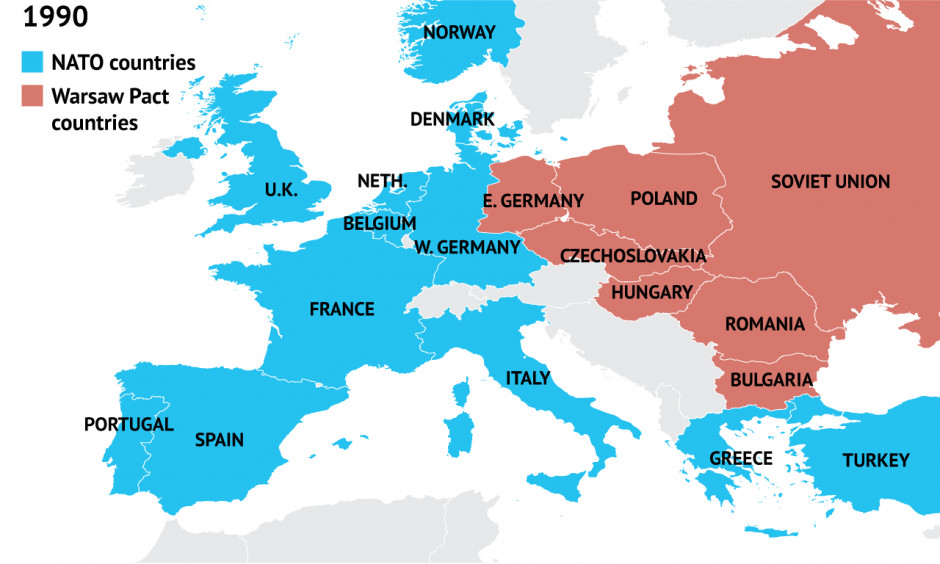




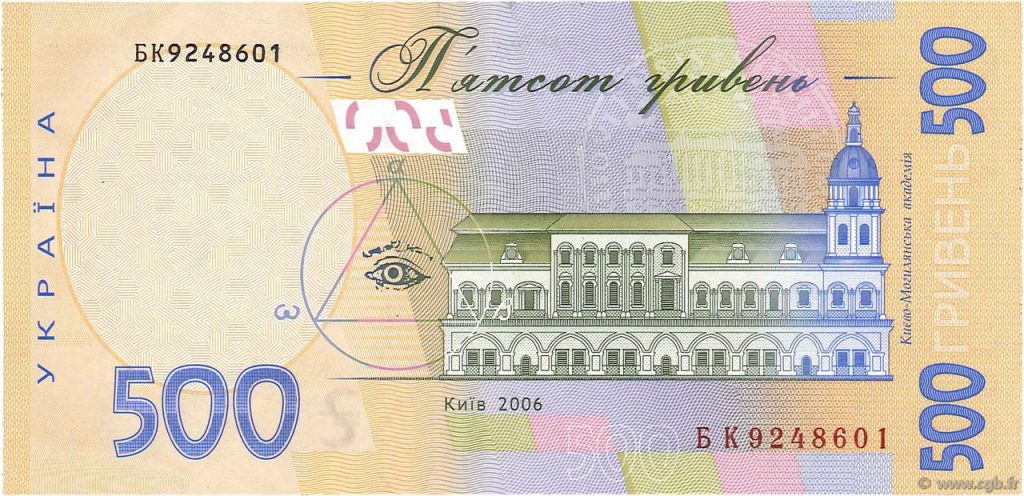
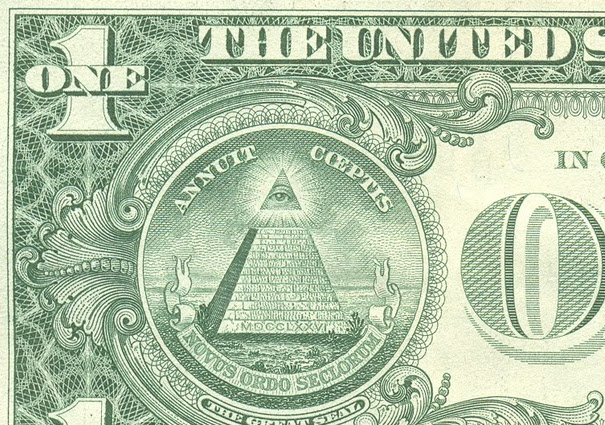

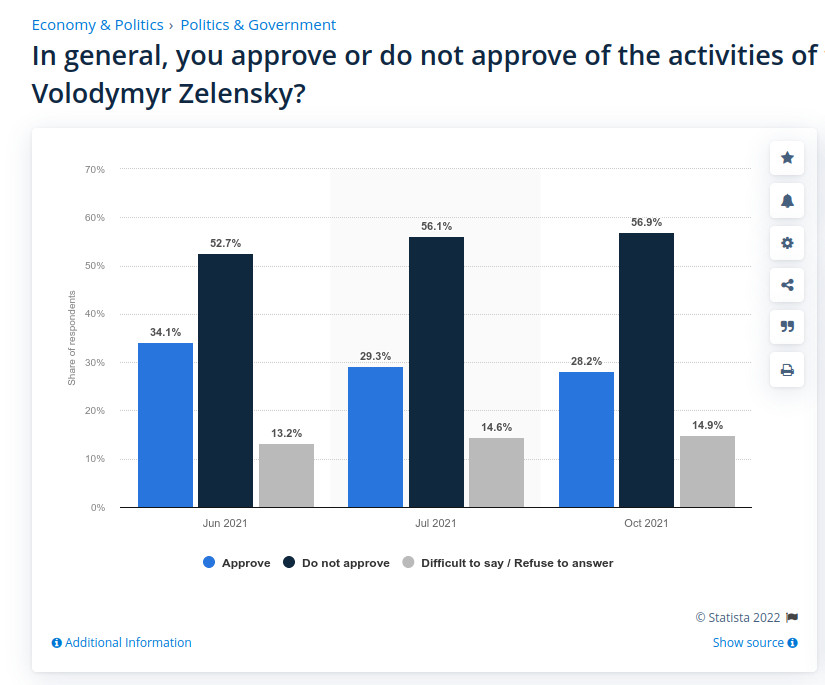
One thought on “Understanding the War in Ukraine”